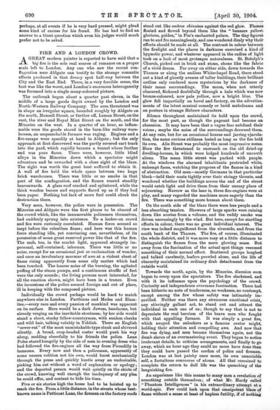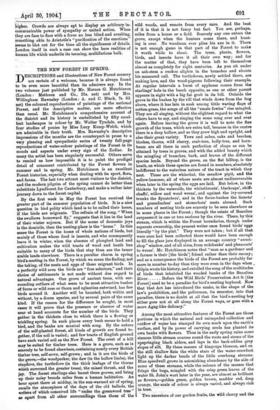A GREAT modern painter is reported to have said that a
big fire is the sole real source of romance on a proper scale left to London. Any one who saw the recent con- flagration near Aldgate can testify to the strange romantic effects produced in that dreary spot half-way between the City and the East End. There, in a very forcible sense, the best was like the worst, and London's enormous heterogeneity was focussed into a single many-coloured picture.
The outbreak began about a quarter past eleven, in the middle of a large goods depot owned by the London and North-Western Railway Company. The area threatened was in shape an irregular square, bounded roughly by Aldgate on the north, Mansell Street, or further off, Leman Street, on the east, the river and Royal Mint Street on the south, and the
Minories on the west. In a quarter of an hour, so inflam- mable were the goods stored in the barn-like railway ware- houses, an unquenchable furnace was raging. Engines and a fire-escape were speedily at hand in Aldgate ; but the only approach at first discovered was the partly covered cart track into the yard, which rapidly became a tunnel whose further end was pure flame. There were, however, little blind alleys in the Minories down which a spectator might adventure and be rewarded with a close sight of the blaze. The sight was worth the great heat suffered to obtain it. A wall of fire held the whole space between two huge brick warehouses. There was little or no smoke in that part of the conflagration, and the flames roared steadily heavenwards. A glass roof cracked and splintered, while the thick wooden beams and supports flared up as if they had been paper. Nothing but lack of more fuel could check the destruction there.
Very soon, however, the police were in possession. The Minories and Aldgate were the first places to be cleared of the crowd which, like the innumerable policemen themselves, had suddenly sprung into existence. To a looker-on crowd and fire were curiously correlated. Human force seemed so inept before the relentless flame ; and here was this human force standing idle, yet convincing one, nevertheless, of its possession of some great reserved power like that of the fire. The mob, too, in the scarlet light, appeared strangely im- personal, self-contained, inhuman. There was little or no noise, except for an occasional jest or exclamation of wonder, and once an involuntary murmur of awe at a violent sheet of flame rising apparently from some oily matter which had been touched. The hoarse noise of the burning, the agitated puffing of the steam pumps, and a continuous shuffle of feet were the only sounds ; the living persons most interested, for all the emotion shown, might have been in a trance. Even the incursions of the police seemed foreign and out of place, ill in keeping with the composed picture.
Individually the crowd perhaps would be hard to match anywhere else in London. Parthians and 3/Iedes and Elam- ites,—every race and every passion of mankind was apparent on its surface. Here would be a dark Jewess, handsome, but already verging on the inevitable stoutness; by her side would stand a short, stocky fellow-countryman, with sunken cheeks and wild hair, talking volubly in Yiddish. There an English "sewer-rat" of the most unmistakable type slunk and shivered silently. A broad, crop-headed coster would push his way along, nodding cheerfully to his friends the police. Lean Poles stared hungrily by the side of men in evening dress who had followed the fire-engines all the way from Piccadilly in hansoms. Every now and then a policeman, apparently of some unseen volition not his own, would burst mechanically through the press and quickly hustle away an undesirable, picking him out without a word of explanation or apology; and the deported person would wait quietly on the skirts of I the crowd, knowing well enough the inadequacy of any plea i he could offer, and content to bide his time.
Five or six stories high the hoses had to be hoisted up to reach the fire. From a little distance, in the streets whose best- known name is Petticoat Lane, the firemen on the factory roofs glorious, golden," in Poe's enchanted palace. The tiny figures ran to and fro meaninglessly, and one wondered dimly why their efforts should be made at all. The contrast in colour between the firelight and the places in darkness exercised a kind Of hypnotic power, and whatever appeared in the radius of light took on a look of most grotesque naturalness. St. Botolph's Church, picked out in brick and stone, shone like the fabric of a vivid dream. Far away on either side, down towards the Thames or along the endless Whitechapel Road, there stood out a kind of ghostly avenue of taller buildings, their brilliant outline only rendered more mysterious by the darkness of their mean surroundings. The moon, when not utterly obscured, flickered doubtfully through a halo which was now bronze-coloured, now pale yellow, now a bright blue. The glow fell impartially on hovel and factory, on the advertise- ments of the latest musical comedy or lurid melodrama and on posters in strange Hebrew characters.
Silence throughout maintained its hold upon the crowd, for the most part, as though the pageant had become an obsession. It may have been that a vague fear subdued their voices ; maybe the noise of the surroundings drowned them. At any rate, but for an occasional hoarse and jarring ejacula- tion, the same curious stillness lasted as long as the fire hela its own. Alie Street was probably the most impressive scene. Here the fire threatened to encroach on the old dried-up dwelling-houses, in which were lodged hundreds of uncouth aliens. The mean little street was packed with people. At the windows the alarmed inhabitants protruded white, unkempt faces, watching the progress of the flames in a kind of abstraction. Old men—mostly Germans in that particular block—held their coats tightly over their stringy throats, and wondered whether the buildings across the end of the street would catch light and drive them from their uneasy place of sojourning. Narrow as the lane is, three fire-engines were at play, and many regarded the machines more eagerly than the fire. There was something more human about them.
On the south side of the blaze there were less people and a less absorbing tension. Showers of large sparks were raining down like scoriae from a volcano, and the ruddy smoke was driven unceasingly by the wind. But here, except for startling effects in colour, there was no great individual interest. The view was indeed magnificent from the riverside, and from the south bank of the Thames. The fire, of course, illuminated the whole district, and it was more easy at a little distance to distinguish the flames from the mere glowing mass. But away from the fascination of the actual spot things resumed something of their normal effect. Scattered groups laughed and talked carelessly, loafers prowled alone, and the life of obscurity maintained its ordinary drab detachment from the outside world.
Towards the north, again, by the Minories, disunion sootL began to creep upon the spectators. The fire slackened, and with it its influence upon the psychology of the crowd. Curiosity and independence overcame fascination. There had been hitherto no note of tenderness, no weakness, no contempt, except among the few whose safety was intimately im- perilled. Neither was there any strenuous emotional crisis, any stirringly gallant act, to stand out and attract the individual in each one of us ; though to say that is not to depreciate the real heroism of the brave men who fought with that appalling furnace. It was simply a great fire, which swayed the onlookers as a famous orator might, holding their attention and compelling awe. And now that fire was dying, and men became themselves again, not the dumb slaves of an overmastering event. They began to notice irrelevant details, to criticise arrangements, and finally to go away, which an hour ago they could no more have done thali they could have passed the cordon of police and firemen. London was at last patchy once more, its own unsociable self, a fortuitous concourse of atoms. All that remained to complete the return to dull life was the quenching of the languishing fire.
An experience like this means to many men a revelation of something outside themselves ; of what Mr. Hardy called "Phantom Intelligences" in his extraordinary attempt at a world-epic. Few could look upon that omnipotent blaze of flame without a sense at least of hapless futility, if of nothing
higher. Crowds are always apt to display an arbitrary in- communicable power of sympathy or united action. When they are face to face with a force no less blind and crushing, something akin to Aristotle's "purification of the emotions" seems to blot out for the time all the significance of details.
on d o n itself in such a case can show the bare realities of human life which underlie its teeming, multifarious bulk.























































 Previous page
Previous page